Bohol
VIP
'Where is the help?': black tea and dark despair as Somalia edges closer to famine
Sunday March 12, 2017
By Ben Quinn in Burao
With nothing to eat and no sign of respite, people in the Somali town of Caynabo are fighting to stave off malnutrition and disease as they survive off scraps
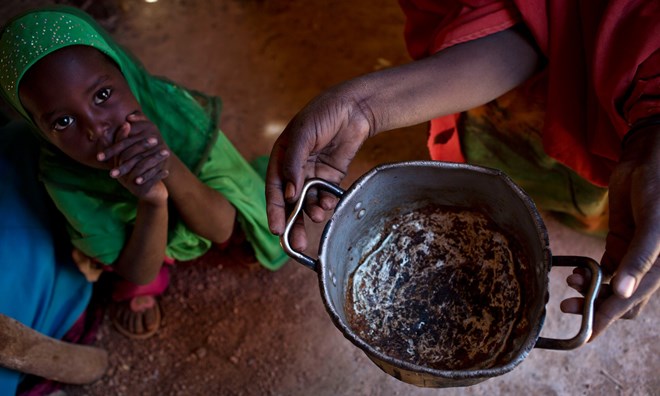
Empty cooking pots are seen inside a makeshift home at a settlement near the town of Caynabo in Somalia. Photograph: Kate Holt/Unicef
On a rock-hard dust bowl of barren land outside the Somali town of Caynabo, more than a thousand people have pitched up makeshift shelters as they figure out how to survive. Searing drought has all but destroyed their pastoral lifestyle and now it threatens to kill them.
They are among 6 million people here in Somalia in need of urgent food assistance to prevent a repeat of the 2011 famine that claimed a quarter of a million lives.
Amina Dahir, a mother in her 30s, travelled for two days and two nights to get to Caynabo after the last remnants of the family’s livestock perished. She was accompanied by her six children and other relatives.
“People are coming every day like us, carrying what little belongings they have. But there is nothing here for us – nothing to eat, nowhere to go,” she says, holding up the empty bowl from which the family consumed their last remaining food this morning – a few portions of plain rice – along with their final water reserves.
Dahir is among the many people here who say little or no aid has arrived. As acute malnourishment and disease take hold among the group’s children, she asks a simple question. “Where is the help from our own government or the international community?”
Somalia is one of three countries at risk of famine. In parts of South Sudan, it has already been declared. The world faces the unprecedented prospect of four simultaneous famines.
Three consecutive years of drought have left two regions of Somalia on the brink of emergency. These areas are marked out in red on the food security maps compiled by UN agencies (pdf), the final stage before a darker hue denotes famine.
The red areas include a large, densely populated area of south Somalia where some districts are under the control of Islamist insurgents al-Shabaab, making access complicated. In the other red areas, which spread over the self-declared autonomous states of Somaliland – encompassing the region where Amina Dahir and her family find themselves, – and Puntland security is less of an issue.
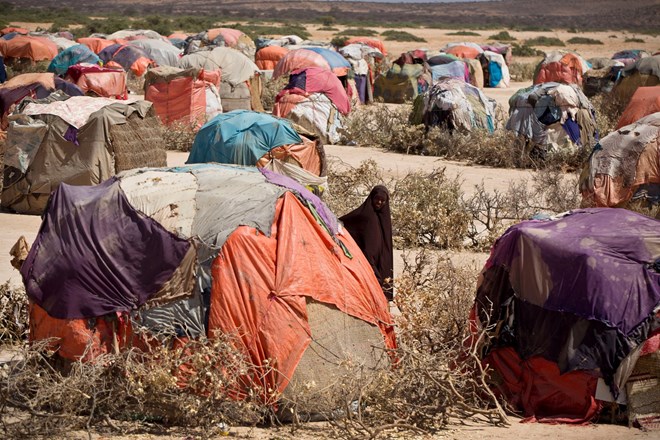
Temporary shelters near the town of Caynabo in Somalia. Photograph: Kate Holt/Unicef
Here, once green pastures have become dust, the scale of the crisis evident in the carcasses of goats and sheep that litter the roadsides.
Dr Hamud Mohamed needs no coded maps to gauge the scale of the problem. At a health centre outside Somaliland’s second largest city, Burao, dozens of mothers wait patiently with their babies for immunisations, antenatal care and other treatment. He gestures to a wall chart that shows the alarming rise in the number of moderately and severely malnourished children.
“We are seeing malnourished children coming in every morning, but the most severe cases are from families who have been forced to move to this area recently because of the drought,” says Mohamed, whose clinic provides nutritional support through schemes funded by Unicef, the UN children’s agnecy, and the World Food Programme.
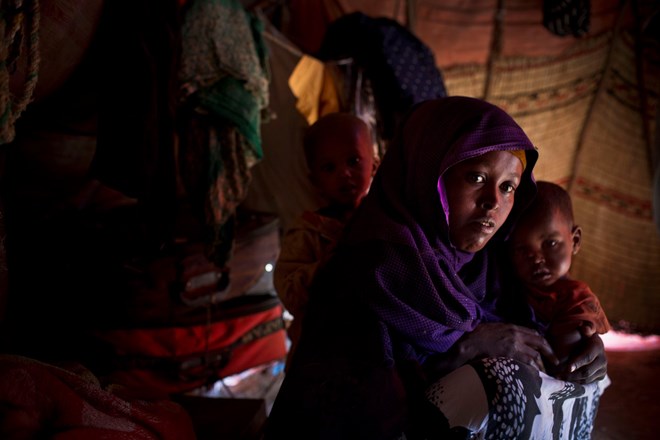
Sara Fara Mohamud’s two young children are suffering from flu and diarrhoea. She has been able to obtain medicine but has no food. Photograph: Kate Holt/Unicef
Treatments include the use of Plumpy’nut, the peanut-based paste, rich in calories and protein, used to help starving children gain weight
“The other problem with a drought is how malnutrition complicates other medical conditions. We’ve already seen an outbreak of measles and other conditions that worsen and reduce the lifespan of a child,” says Mohamed.
Some new arrivals in the area are too disorientated or distressed to find help. At Burao airstrip, less than 20 minutes away by foot, Roda Mahamud sits with hundreds of other families. She quietly rocks her pale and listless two-year-old niece, Ayan, who she has been looking after since the child’s mother died giving birth. The family, which includes 10 children, has been surviving on occasional portions of rice and sometimes just black tea. They had arrived weeks earlier, but were still unaware of the clinic.
Mahamud’s relative, Keyse Farah Abdi, says they walked for days to come here, having heard a rumour that the Somaliland authorities were bringing assistance to the area.
They waited, availing themselves of water from a tanker as well as small amounts of rice an donations of tea and sugar from the community, but aid has yet to materialise. Their few remaining goats are slowly dying.
“We heard from people that grass and water would be here but there is nothing. Now we scavenge and get donations,” says Abdi, a softly spoken pastoralist who has traditionally moved with the goats a few times a year to find grazing land. His anxiety about the desperate plight of his family was etched on his face.
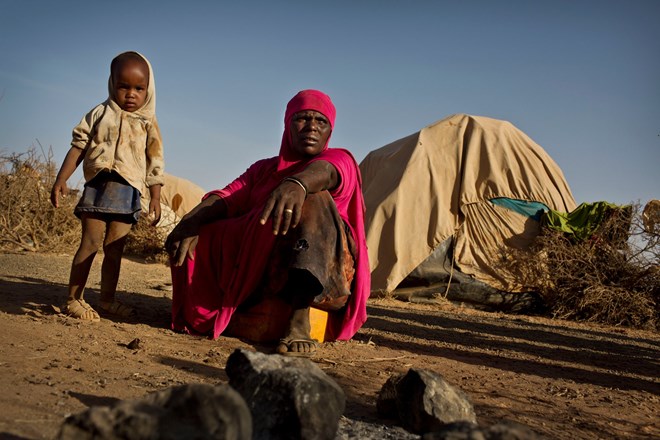
Roda Mahamud and her niece, Ayan, who hasn’t eaten properly for weeks. Photograph: Kate Holt/Unicef
Humanitarian workers and NGOs have issued repeated warnings. Save the Children cautioned this week that the international community is failing to learn the lessons that led to the last famine, stressing that all the early warning signs of an avoidable catastrophe are evident.
The charity’s chief executive, Kevin Watkins, said on a visit to Puntland this week that the scale of the suffering is even greater than at the equivalent stage in 2011, with deaths from cholera and acute diarrhoea rising sharply.
“Given the weight of evidence, the scale of suffering and the memory of 2011, the international community’s response to the crisis facing Somalia’s children is indefensible and unforgivable,” said Watkins, who called on aid donors to act urgently. An estimated £677m is needed by June to keep people alive and start the recovery process.
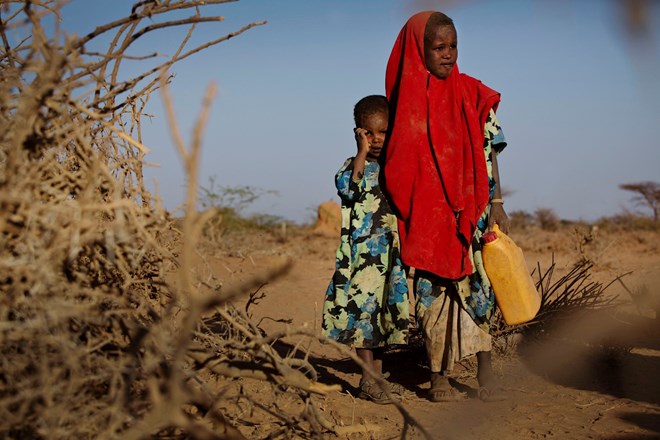
Similar criticism was voiced by ActionAid, which pointed out that the 2017 UN appeal for Somalia has received £110m from donor countries – just 11% of what was requested.
Hunger and disease mean countless lives are at stake yet at this rate food won’t arrive until after people begin dying,” said head of humanitarian response Mike Noyes.
Of the aid already in the pipeline, Britain’s Department for International Development has allocated £100m to Somalia as part of a wider Horn of Africa response. More than £20m of that is already being spent by Unicef on work such as screening and treating malnourished children, rehabilitating water boreholes and immunisation programmes.
As with other “pre-famine” appeals however, the financial clout of the US has yet to be felt. While the US contributed nearly $855m to support relief interventions in the wider Horn of Africa in 2016 (pdf), USAid’s food aid programme for 2017 consists of an estimated $171m of assistance spread across Djibouti, Ethiopia, Kenya, and Somalia.
Back on the side of a road half an hour’s drive outside of Caynabo, Nuur Mohamed says he has been reduced to begging for food in the town and trying to catch scrawny dik-dik antelope by night. His family and others erected shelters near to the leaking watertank here after his entire herd of 25 camels and 100 sheep and goats died.
A veteran of Somaliland’s war of independence, the 56-year-old says: “We’re proud of the country that we have become and whatever happens I am proud of my part in that. We have our freedom still. But only now we have this drought. It was brought by God. I don’t have any other answer.”
https://www.theguardian.com/global-...mine-where-is-the-help-black-tea-dark-despair
Sunday March 12, 2017
By Ben Quinn in Burao
With nothing to eat and no sign of respite, people in the Somali town of Caynabo are fighting to stave off malnutrition and disease as they survive off scraps

Empty cooking pots are seen inside a makeshift home at a settlement near the town of Caynabo in Somalia. Photograph: Kate Holt/Unicef
On a rock-hard dust bowl of barren land outside the Somali town of Caynabo, more than a thousand people have pitched up makeshift shelters as they figure out how to survive. Searing drought has all but destroyed their pastoral lifestyle and now it threatens to kill them.
They are among 6 million people here in Somalia in need of urgent food assistance to prevent a repeat of the 2011 famine that claimed a quarter of a million lives.
Amina Dahir, a mother in her 30s, travelled for two days and two nights to get to Caynabo after the last remnants of the family’s livestock perished. She was accompanied by her six children and other relatives.
“People are coming every day like us, carrying what little belongings they have. But there is nothing here for us – nothing to eat, nowhere to go,” she says, holding up the empty bowl from which the family consumed their last remaining food this morning – a few portions of plain rice – along with their final water reserves.
Dahir is among the many people here who say little or no aid has arrived. As acute malnourishment and disease take hold among the group’s children, she asks a simple question. “Where is the help from our own government or the international community?”
Somalia is one of three countries at risk of famine. In parts of South Sudan, it has already been declared. The world faces the unprecedented prospect of four simultaneous famines.
Three consecutive years of drought have left two regions of Somalia on the brink of emergency. These areas are marked out in red on the food security maps compiled by UN agencies (pdf), the final stage before a darker hue denotes famine.
The red areas include a large, densely populated area of south Somalia where some districts are under the control of Islamist insurgents al-Shabaab, making access complicated. In the other red areas, which spread over the self-declared autonomous states of Somaliland – encompassing the region where Amina Dahir and her family find themselves, – and Puntland security is less of an issue.

Temporary shelters near the town of Caynabo in Somalia. Photograph: Kate Holt/Unicef
Here, once green pastures have become dust, the scale of the crisis evident in the carcasses of goats and sheep that litter the roadsides.
Dr Hamud Mohamed needs no coded maps to gauge the scale of the problem. At a health centre outside Somaliland’s second largest city, Burao, dozens of mothers wait patiently with their babies for immunisations, antenatal care and other treatment. He gestures to a wall chart that shows the alarming rise in the number of moderately and severely malnourished children.
“We are seeing malnourished children coming in every morning, but the most severe cases are from families who have been forced to move to this area recently because of the drought,” says Mohamed, whose clinic provides nutritional support through schemes funded by Unicef, the UN children’s agnecy, and the World Food Programme.

Sara Fara Mohamud’s two young children are suffering from flu and diarrhoea. She has been able to obtain medicine but has no food. Photograph: Kate Holt/Unicef
Treatments include the use of Plumpy’nut, the peanut-based paste, rich in calories and protein, used to help starving children gain weight
“The other problem with a drought is how malnutrition complicates other medical conditions. We’ve already seen an outbreak of measles and other conditions that worsen and reduce the lifespan of a child,” says Mohamed.
Some new arrivals in the area are too disorientated or distressed to find help. At Burao airstrip, less than 20 minutes away by foot, Roda Mahamud sits with hundreds of other families. She quietly rocks her pale and listless two-year-old niece, Ayan, who she has been looking after since the child’s mother died giving birth. The family, which includes 10 children, has been surviving on occasional portions of rice and sometimes just black tea. They had arrived weeks earlier, but were still unaware of the clinic.
Mahamud’s relative, Keyse Farah Abdi, says they walked for days to come here, having heard a rumour that the Somaliland authorities were bringing assistance to the area.
They waited, availing themselves of water from a tanker as well as small amounts of rice an donations of tea and sugar from the community, but aid has yet to materialise. Their few remaining goats are slowly dying.
“We heard from people that grass and water would be here but there is nothing. Now we scavenge and get donations,” says Abdi, a softly spoken pastoralist who has traditionally moved with the goats a few times a year to find grazing land. His anxiety about the desperate plight of his family was etched on his face.

Roda Mahamud and her niece, Ayan, who hasn’t eaten properly for weeks. Photograph: Kate Holt/Unicef
Humanitarian workers and NGOs have issued repeated warnings. Save the Children cautioned this week that the international community is failing to learn the lessons that led to the last famine, stressing that all the early warning signs of an avoidable catastrophe are evident.
The charity’s chief executive, Kevin Watkins, said on a visit to Puntland this week that the scale of the suffering is even greater than at the equivalent stage in 2011, with deaths from cholera and acute diarrhoea rising sharply.
“Given the weight of evidence, the scale of suffering and the memory of 2011, the international community’s response to the crisis facing Somalia’s children is indefensible and unforgivable,” said Watkins, who called on aid donors to act urgently. An estimated £677m is needed by June to keep people alive and start the recovery process.

Similar criticism was voiced by ActionAid, which pointed out that the 2017 UN appeal for Somalia has received £110m from donor countries – just 11% of what was requested.
Hunger and disease mean countless lives are at stake yet at this rate food won’t arrive until after people begin dying,” said head of humanitarian response Mike Noyes.
Of the aid already in the pipeline, Britain’s Department for International Development has allocated £100m to Somalia as part of a wider Horn of Africa response. More than £20m of that is already being spent by Unicef on work such as screening and treating malnourished children, rehabilitating water boreholes and immunisation programmes.
As with other “pre-famine” appeals however, the financial clout of the US has yet to be felt. While the US contributed nearly $855m to support relief interventions in the wider Horn of Africa in 2016 (pdf), USAid’s food aid programme for 2017 consists of an estimated $171m of assistance spread across Djibouti, Ethiopia, Kenya, and Somalia.
Back on the side of a road half an hour’s drive outside of Caynabo, Nuur Mohamed says he has been reduced to begging for food in the town and trying to catch scrawny dik-dik antelope by night. His family and others erected shelters near to the leaking watertank here after his entire herd of 25 camels and 100 sheep and goats died.
A veteran of Somaliland’s war of independence, the 56-year-old says: “We’re proud of the country that we have become and whatever happens I am proud of my part in that. We have our freedom still. But only now we have this drought. It was brought by God. I don’t have any other answer.”
https://www.theguardian.com/global-...mine-where-is-the-help-black-tea-dark-despair



 using droughts in the regions inhabited by siilanyo's qabiil to take shots at hj is low
using droughts in the regions inhabited by siilanyo's qabiil to take shots at hj is low